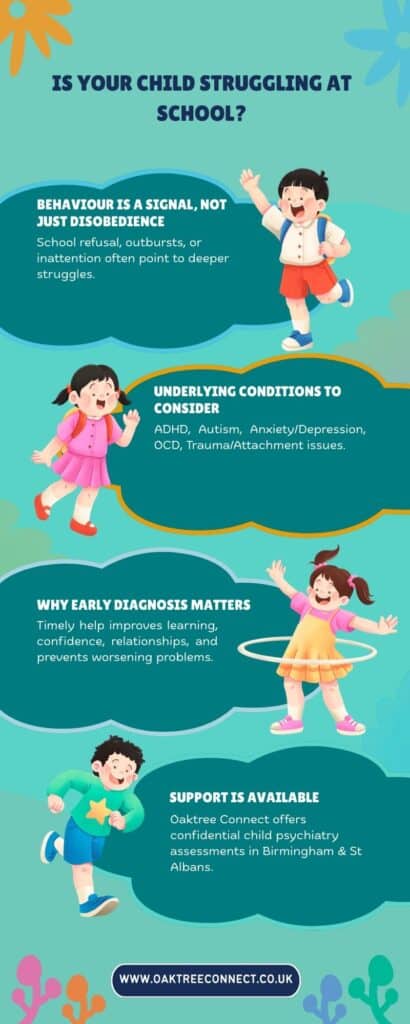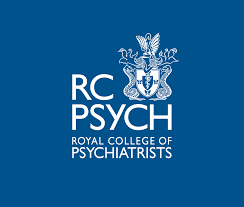Is Your Child Struggling at School? It Might Be More Than Just Behaviour

"Taking care of your mind is the bravest step toward healing, asking for help is strength, not weakness."
— Oaktree Connect
The experience of having to see your child face difficulties in school becomes deeply emotional for parents. Equally distressing for all concerned are signs of academic decline despite high potential with school avoidance or disruptive behaviours in the classroom. Our first instinct as parents tends to be that these are either disciplinary problems or insufficient effort on part of the child or young person.
The truth is that these behaviours often indicate underlying complex social, emotional and mental health related issues. The whole situation can be complicated and multi factorial and beyond what meets the eye.
Part of my job at Oaktree Connect as a child psychiatrist is to encourage parents and carers to look beyond the behaviours and explore the possibility of underlying emotional or developmental conditions when behavioural challenges arise.
Behaviour Often Signals a More profound Issue
Children show challenging behaviour only when they have a valid reason. Children display what seems like defiance and inattentiveness and emotional outbursts because they lack the ability to express their inner struggles through words.
In many situations, persistent behavioural concerns may be linked to underlying conditions, such as:
- Attention-Deficit/Hyperactivity Disorder (ADHD)
- Autism Spectrum Disorder (ASD)
- Anxiety or Depression
- Obsessive-Compulsive Disorder (OCD)
- Trauma or early attachment difficulties
The process of labelling a child as difficult or disruptive without proper understanding may further exacerbate academic and social difficulties. A delay in the support that child genuinely needs could significantly affect their educational and developmental journey. A professional evaluation can offer clarity and reassurance during an uncertain time.
The Importance of Early Diagnosis
Early detection of emotional, behavioural or neurodevelopmental issues leads to better long-term results for children. A timely diagnosis allows for the implementation of suitable interventions, which may include school-based support, psychological intervention and appropriate medication.
With the right support in place, children can:
- Re-engage with learning
- Build self-esteem and confidence
- Strengthen family relationships
- Reduce emotional distress
- Avoid further academic or social difficulties in adolescence
These young people need a specialist psychiatric assessments as early as it can be arranged, helping families move from concern to clarity with compassionate clinical care.

How a Psychiatrist Can Help
Psychiatrists are medically trained specialists in mental health having post graduated in psychiatry. Psychiatrists evaluate the full range of factors including biological, psychological, and environmental that affect a child’s wellbeing, and diagnose complex conditions that might be affecting behaviour and emotional health.
A child and adolescent psychiatrist can provide:
- A detailed evaluation of behavioural and emotional symptoms
- Diagnosis based on clinical standards and developmental history
- Guidance on appropriate therapeutic interventions or school-based support
- Prescriptions for medication, if clinically indicated and with full parental consent
This medical perspective ensures a comprehensive and structured approach to understanding your child’s needs.
School Difficulties That May Warrant a Psychiatric Assessment
If your child is experiencing any of the following challenges, it may be worthwhile to seek a professional opinion:
- Difficulty concentrating or sitting still in class
- Recurrent emotional outbursts, anxiety or irritability
- Frequent complaints of physical illness without a clear cause
- Avoidance of school or school-related anxiety
- Changes in eating, sleeping, or social habits
- Struggling to maintain friendships or interact with peers
- Falling behind academically despite putting in effort
Such difficulties are often misunderstood or attributed to poor attitude and labelled as challenging behaviours. This can then escalate to the teachers further excluding or penalising the young people, until it becomes a vicious circle that is hard to break. These are early indicators of treatable mental health or developmental conditions and if ‘nipped in the bud’ with early intervention, may prevent mental disorders altogether.
Support is Available
Oaktree Connect recognises the intense challenges that families encounter when they need to support their struggling child. Our team of experienced child and adolescent psychiatrists conducts complete confidential assessments within a supportive environment.
We provide assistance to families who want to assess their child because of behavioural changes or when schools or GPs recommend additional evaluation.
Book an Appointment
Our team welcomes parents who wish to discuss potential school-related issues that extend beyond behavioural problems with their child.
Our clinics in Birmingham and St Albans provide private psychiatric assessments for children and young people.
To find out more or to book an appointment, please visit:
Oaktree Connect
Private Child and Adolescent Psychiatry Services
Supporting children and families with care, clarity, and clinical expertise.
Please note: This article is intended for informational purposes and should not replace individual medical advice. If you have urgent concerns about your child’s safety or mental health, please contact your GP or local emergency services.
Disorder Related Blogs
- Anorexia Nervosa: Recognise the Quiet Killer
- Patient Talk - What Does Severe Clinical Depression Feel Like?
- Dear Mum: A Story by an Oaktree Patient with Depression
- SCHIZOPHRENIA – A Poem
- Autism: Dispelling Myths
- Mental Fitness: “I Have an Addiction”
Lifestyle Related Blogs
- Preventing Online Burnout
- Sad at Christmas? Help Is at Hand
- Burnout at Work
- Mental Fitness: How to Beat Stress
- Mental fitness: Brain Stimulation Therapy
- Mental Fitness: When Should You Stop Driving?
- Mental Fitness: “Let Us Talk About It”
- How to Combat Work-Related Stress
- Foods that make you happy
- Business Spending on Mental Health, Worth it?
- Employers Need More Awareness of Mental Health Issues
Other Blogs
Are you a leader and need mentoring or coaching? We may be able to help. Contact us at contact@oaktreeconnect.co.uk.
Author: Dr Sobia Rafi
Dr Rafi is the Child and Adolescent Psychiatrist, Oaktree Connect. With 20 years she is a highly skilled and experienced psychiatrist specializing in the assessment and management of both common and complex psychiatric and behavioral disorders in children and adolescents.
Contact:
Email – clinicadmin@oaktreeconnect.co.uk
Telephone – +44 75115 46374
Recent Blogs
Oaktree Connect Fees & Pricing for Other Services
There may be additional fees payable after your assessment, for which you will receive an invoice: for example, for the costs for prescribing medication agreed between you and the psychiatrist at the time of assessment. We try our utmost to stay within the time allocated for the appointment however, you could be charged for any extra time spent in the consultation, if the meeting runs over the allocated time, or where communications with you or reviewing notes etc. exceeds what is deemed reasonable, but this is at the discretion of the clinician.
















